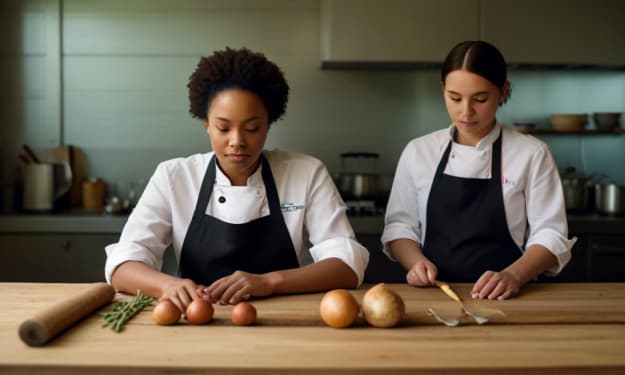
The key is communication. Here are some advice from experts on how to go from a casual to a committed relationship, if that's what you desire.
Contrary to what your mother may believe, the days of asking your crush to "go steady" are long gone, and just because you had a few dates doesn't mean that you are in a committed relationship. Let's face it: Dating in the 21st century's Wild, Wild West is a little more difficult when transitioning from a casual to a serious relationship.
Even yet, it might be annoying if after a few months of seeing this person at least once a week, you are still unsure of where things stand. What then should you do if you wish to convert this casual pairing into a serious relationship? There isn't a straightforward solution, I'm sorry. According to New York City-based lifestyle and relationship expert Terri Trespicio, "Every individual and relationship is different, and there's no magic word or deed that will compel her or him to commit."
To figure out whether they are on the same page as you—or even on a different planet—you may use these communication strategies to make sure you are clear about what you want.
How to Change a Relationship From Casual to Committed

Ensure that you desire it.
You decide you desire a committed relationship with this particular someone, but before you take any more action, be sure you really want to make that transition from a casual to a serious one. Trespicio advises taking a step back and asking yourself some hard questions. Do they make me laugh? Do they make me feel better while we're together? When we say goodbye, do I feel good about myself? Are they better for me? What about respect?
You should consider the "J" word: jealousy, in addition to those crucial concerns that you should be asking yourself. You may want to rethink things before formally transitioning from casual dating to a serious relationship if they're behaving very jealous or watching your every move (if at all). Additionally, you shouldn't convince yourself, "Well, they seem like a lovely person and haven't done anything wrong, so I think I should be with them," which is also very crucial.
Why? Trespicio explains, "That's persuading oneself of something that's probably wrong." The bottom line is to be in a committed relationship in which you feel okay without them but even better with them.
Avoid rushing to DTR right away.
Although it may seem paradoxical, it is best to take a moment before starting the DTR topic (also known as the "what are we?" inquiry) when transitioning from casual dating to a committed relationship. According to Trespicio, it's similar to arriving to a party, shutting down the music, turning on the lights, and asking, "Are we all having a nice time here?" Putting an end to the pleasure to 'check in' is a guaranteed way to destroy the romance, she adds, since "a strong relationship is based on momentum."
Of course, this isn't the case for every relationship, however it could be preferable to avoid bringing up this important topic over, say, a dinner gathering with their friends. Additionally, it is much more important to make an effort before popping the question if your possible partner has shown any indications of commitment anxiety. People who are hesitant to commit want to feel in control of the relationship; they don't want to feel like they are being forced into a cage, continues Trespicio.
But if you need more proof that this casual flirtation may be serious, consider the evidence: Do they attempt to see you whenever they have time? Do they seem sincere in their interest in what you have to say? Do they like going out on dates as much as you do? Yes, again, and again? Very good: Enjoy being with them and don't worry about making things "formal" since these are probably signals they're in it for the long haul.
Lightly raise it.
But don't think you have to be in the dark always. Speaking up, advises relationship expert and certified personal coach Jennifer Kelman, L.C.S.W., if it's been about six months and they haven't given any hints about where they see this thing heading. For instance, if you want them to meet your parents, ask them if they'd be interested in coming to dinner, but reassure them that it won't hurt if they're not quite ready for that just yet. Above all, keep the conversation light-hearted and keep the channels of communication open.
Tell them that you're prepared to go from a casual to a committed relationship if you feel certain that you want things to be serious at this time, advises Trespicio. She advises, "Define what commitment means to you without presenting an ultimatum, and explain what type of relationship you desire and why." Allow them to reflect on it for a few weeks if they aren't interested in talking about it. However, if they remain silent when you bring it up again, it may be time to reconsider your relationship. You must choose between wanting someone who is dedicated and wanting this individual, even if he will never be committed, says Trespicio.
Connect through unplugging.

When planning your next date, think outside of dinner and drinks. The ideal date, according to Kelman, "allows you to put the phone down, stop texting, and truly cultivate a deep relationship." Even while eating out might be enjoyable, every so often, branch out a bit. Visit a craft beer festival, see a live band at a dive bar, or challenge them to a mountain bike race, for instance. A new experience may strengthen your link since it provides you with shared experiences to reflect on in the future. This greater connection can aid both parties in transitioning from a "cool and casual" relationship to one that is devoted.
Additionally, the dates your spouse suggests may also reveal something about their feelings to you. "That's a solid indicator of romance," adds Trespicio, "if they propose going to the Georgia O'Keefe show because they recall you adore her paintings."
Let your unselfish side come through.
Volunteering for a cause you believe in or performing a tiny act of kindness for a complete stranger, like helping an elderly person carry their groceries, may make you seem more serious to a possible spouse. (Also, it is morally correct to carry out nice activities on a regular basis.) According to a recent British research, respondents found long-term partners more desirable for sex if they have altruistic traits. According to Kelman, "giving back to others displays your good heart and honesty."
This does not mean that you should become obsessed with seizing chances and behaving in a certain manner only to impress your spouse. Rather, whether or whether you volunteer every week, a great partner should be able to recognize all of your amazing traits and therefore be open to a committed relationship. However, even the tiniest acts of kindness may lift your spirits (really, studies prove it!) and make your optimistic S.O. swoon uncontrollably.
Keep your and their freedoms intact.
When you find someone whom you believe to be your ideal spouse, it is simple to let some aspects of yourself go. But don't. As Kelman puts it, "Trying to be someone you're not is so apparent." Additionally, and this is crucial, a suitable spouse (and you, too, for that matter) should embrace your personality with all of its peculiarities. Don't pretend to love the Steelers or comprehend abstract art simply because the person you're dating is a fan if you'd rather pull out your own teeth than watch football or visit an art museum.
Are you a puzzle enthusiast? Gardening is your passion. Own it! Maintaining your own hobbies may show how fascinating your life is, with or without your spouse, in addition to emphasizing the importance of being loyal to yourself. You want to be the fast-moving vehicle that people want to get into, not the one that is waiting about in the parking lot, according to Trespicio. Therefore, continue your weekend long runs even if they want to hang out, and don't anticipate them to forgo their regular basketball games in order to see you. According to Kelman, having her own independence and strength is what partners find most attractive. Additionally, you won't prioritize your connection above your sense of self.
Be a good example by being caring.

Nobody likes to be the target of apathy, thus if you like this individual, you should demonstrate your interest in them. Therefore, avoid checking your phone or darting your eyes around the room when out to eat. To be clear, this is the standard your spouse should uphold as well, so pay attention to whether they are displaying the same levels of interest and love for you.
Here is the ideal amount of time to date before proposing.
You are completely, utterly, irrevocably in love, but there is one minor issue. It may just have been a few weeks or a few months when you first met the individual. You both claim to be hearing wedding bells, but that's absurd, right? Although your heart wants to go more quickly so that you may begin living eternally, your intellect is telling you that you must wait. Are you thus love-drunk, or is your heart communicating a greater truth? When is it too soon to be engaged?
How much time should pass before getting engaged?

If you're wondering "how long should you date before getting married," you may not be surprised to learn that there is no definition of what is "normal." The answers might range from several years to just four days (amazing!).
There isn't a foolproof method, despite the fact that everyone—including your parents, relatives, and friends—will have an opinion on the topic, from "You're going in too early!" to "It took him much too long to propose—are you sure?" The decision to proceed can only be made by you.
Allow yourself time to get to know your partner during both good and bad times.

As a general rule, one to two years is often a fair length of time to date before getting engaged, according to Ian Kerner, PhD, LMFT, a certified psychotherapist, couple's therapist, and author of She Comes First.
According to Kerner, "I've worked with a number of couples who had good connections; they met, fell in love, and really got to know one other's friends and family." "They got to know what it's like to live together or spend a lot of time with each other, go through some life cycle issues, like the loss of a family member or a friend, or go to a wedding or funeral and really getting to know each other in a lot of different contexts and feel like it's a good match. Additionally, it often occurs once a year. You want some issues to arise so you can observe how well you and the issue can be resolved. Instead of the duration, I place greater importance on the variety of experiences that are conducive to compatibility.
Consider all the experiences you have had together as you question if it is appropriate to bring up marriage with your partner. Have you both overcome significant obstacles in life? Have you seen them at both their greatest and lowest points? Have you taken the time to research their family and past? Do you know their assets and weaknesses?
Gaining this experience may take as long as you like. Particularly if you spend a lot of time together, you may rapidly discover a lot about someone. Alternatively, you may date someone for months or years without really getting to know them.
What Kind of Communicator Are You?
While every couple's situation is unique, Tammy Nelson, PhD, licensed relationship therapist, board-certified sexologist, and author of The New Monogamy and Getting the Sex You Want, also holds the opinion that it's more crucial to learn how to communicate during a conflict than to place emphasis on the timing of it.
According to Nelson, "many couples wait until they are ready to have children or ready to purchase a house before they get married." 'Normal' doesn't exist. Based on their families, cultures, and communities, partners could have an implicit expectation about how long a relationship would last. Sometimes, each partner may experience something differently, and if it is not thoroughly articulated in a clear manner, it may cause misunderstandings. "
Take a step back and make sure you and your partner have had those crucial chats if you're wondering whether it's too soon to propose. You should be aware of what your spouse expects from the relationship. Discussing whether you want to have children, how you handle money, and what you both want from the future may also be appropriate at this time.
Do You No Longer Experience "Romantic Love"?
If you feel that your relationship is developing too quickly, you should take into account the possibility that you are still in the honeymoon period. You are aware of our situation. It's when everything your spouse does is both flawless and wonderful, and you find yourself unable to wipe that silly smile from your face.
There is no set period of time that a couple must date before becoming engaged, according to Dr. Nelson, but accepting that all couples experience the "romantic love" phase is the golden guideline for a happy and successful marriage. The pair will then start the power struggle or conflict phase of their relationship, which may last anywhere from 2 days to 26 months. This is normal and most likely won't change for the duration of your marriage or ever (the bad news). The good news is that, with thoughtful preparation and communication, a successful marriage implies that disagreement is unavoidable (and has no bearing whatsoever on whether or not you are in a marriage that will continue). However, how you resolve your dispute is much more crucial. Working to resolve your differences and developing open lines of communication can ensure that your relationship endures for the rest of your lives together, whether you are engaged, cohabiting, or married.
So it doesn't really matter whether you waited five years or five months to propose. The most crucial factor when considering how long to date before proposing is that you two are firmly devoted to one another. Affirmative or negative?
Most people believe they are unloved. If you read this book now, it will change you forever.






Comments
There are no comments for this story
Be the first to respond and start the conversation.